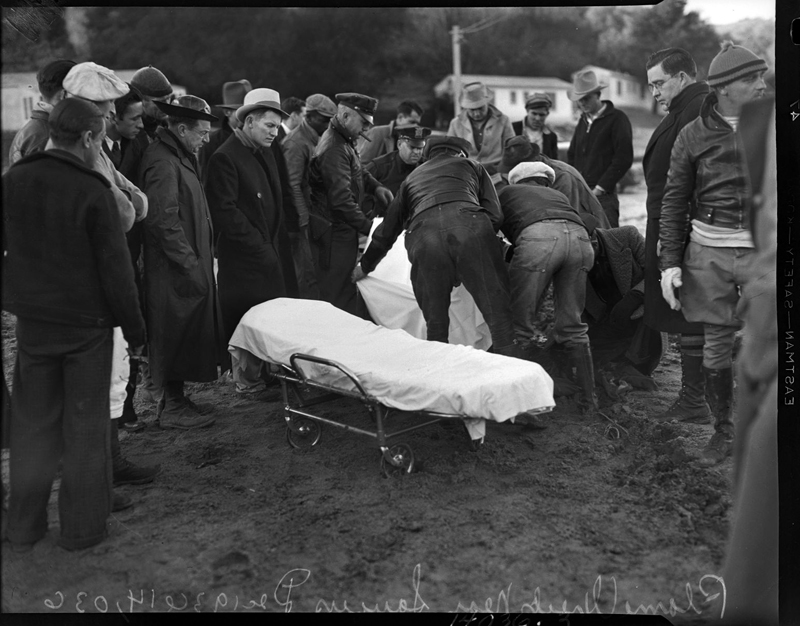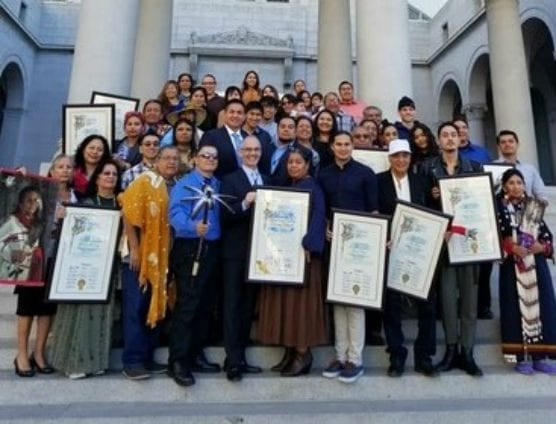The Los Angeles City/County Native American Commission and Los Angeles City Councilmember Mitch O’Farrell celebrated their 2018 American Indian Heritage Month honorees at Los Angeles’ City Hall on Friday, Nov. 2.
Since 1976 the United States has recognized November as Native American Heritage Month. Each November the city and county of Los Angeles celebrate the culture, contributions and heritage of Native Americans. Friday’s recognitions kicked off the 2018 Native American Heritage Month celebration.
Jointly the LANAIC and Councilmember recognized 12 honorees: Glenda Ahhaitty (Cherokee), Harold Freeland (Navajo), Henry & Lucy Hale (Navajo), Toni Hawk (Cheyenne), Votan Henriquez, Adai Lamar, Levi Ponce, Jacob Pratt (Dakota & Ojibway), Taboo (Shoshone), Pat Vega (Yaqui & Shoshone) and PJ Vega (Yaqui & Shoshone).
Votan Henriquez, Adai Lamar, Levi Ponce, Jacob Pratt, Taboo, Pat Vega and PJ Vega were lauded for their contributions to the inaugural Indigenous Peoples Day celebration in Los Angeles, as well as their contributions in their respective fields of arts and music.
This year’s LANAIC selected honorees were Glenda Ahhaitty, Harold Freeland, Henry & Lucy Hale and Toni Hawk. The Commission was pleased to honor these five community members for their numerous contributions to Los Angeles’ Native American community.
The honorees and their families will be honored again at the 2018 LANAIC Pow Wow at Grand Park on Nov. 17 at 5 p.m.
Glenda Ahhaitty (Cherokee)
Ms. Ahhaitty is an enrolled member of the Cherokee Nation of Oklahoma and is originally from Copan, Oklahoma. She has lived in the Southern California area since 1954 and has worked in many capacities, including executive director of the Los Angeles City/County American Indian Commission, DMH volunteer services, coordinator for DMH hearing impaired clients interpreter service and Acting Director of the American Indian Counseling Center.
Additionally, she has had the honor of working in leadership positions on behalf of American Indian women and served for more than ten years as an appointee of the Secretary of Commerce as a member of US Census Advisory Committee on the American Indian population.
Ms. Ahhaitty made immense contributions to the Los Angeles County American Indian and Alaska Native community through her tireless work as the Executive Assistant for the Los Angeles City/County Native American Indian Commission. By championing the creation of the Self-Governance Board and fighting to secure the Community Services American Indian Block Grant funding for Los Angeles County she has ensured that our service providers are better able to address the poverty-related issues that impact our community.
Her leadership on a national level for the urban American Indian and Alaska Native population was instrumental in establishing relationships between the urban AI/AN population and the White House and in turn elevated the issues that impact our community.
Together with her family, she has been an active member of the Native American community in Southern California and in her family’s home communities in Oklahoma.
Harold Freeland (Navajo)
Harold is Navajo, from the Folded Arms People, born for the Two-Who-Came-To-Water Clan. Harold arrived in Los Angeles in January 1972 under the Bureau of Indian Affairs Relocation program after graduating high school in Farmington, NM. He Majored in Commercial Art at Los Angeles Trade Tech College.
After completing his training in 1974, he immediately gained employment in the silkscreen printing business, and designed United American Indian Involvement’s first business card.
After gaining experience, he was hired as an Editorial Graphic Designer at the former Los Angeles Herald Examiner from 1977 to its closing in 1998. During his time there, he was only one of a few Native Americans working in a major metropolitan newspaper.
After that Harold went into freelancing and doing art exhibitions. Eventually, he was hired at the Southern California Indian Center as a graphics instructor for 10 years. At SCIC he illustrated posters and designed booklets for their annual powwow.
He is currently employed at United American Indian Involvement, Inc., as Graphics Support Staff. In his spare time, he travels throughout California, Arizona, New Mexico and Colorado doing art exhibits and gallery shows.
Mr. Freeland has been instrumental to the American Indian community living in Los Angeles, California. His contributions with United American Indian Involvement, Inc. among other Native service organizations like Southern California Indian Center, and the Los Angeles Harold Examiner have helped shape how we communicate visually with one another.
Harold’s contributions of teaching youth about the possibilities of self-expression through the medium of art have been tremendous to sharing their voices. His achievements as an artist, graphic designer, and editorial graphic designer at a prominent newspaper have helped paved a path for young artists in our community.
Henry (Navajo) & Lucy Hale (Navajo)
Henry Hale and Lucy Hale were from the Navajo Nation. Henry was of the Salt Water Clan, born for the Towering House People Clan. Lucy was of the Red House Clan, born for the Big Water Clan. Mr. Hale was originally from the Navajo community of Oak Springs, Arizona, and Mrs. Hale was originally from the Navajo community of Wide Ruins, Arizona.
As part of the U.S. Government’s Indian Relocation Act during the 1940s and 1950s, Henry and Lucy, at a young age, were sent to Sherman Indian Institute in Riverside, California. While at Sherman Henry met his wife Lucy and developed his hoop dance and “old style” fancy dance skills.
Henry and Lucy raised their 4 sons (Benjamin, Bruce, Kevin, and Phillip), and 3 daughters (Kathy, Sandra, and Melinda) in the Los Angeles area. Henry and Lucy were fortunate to become friends with many other individuals and families from various tribes during the following decades, including the Ahhaitty family, and the All Runner/Hawk family.
With the help of some of these families, Henry, Lucy, and the rest of the family were able to gain knowledge about the Plains Indian Pow-Wow culture, particularly the Southern Plains.
Henry and Lucy were instrumental in sustaining the pow wow tradition here in Los Angeles. Community members remember them fondly for being welcoming, friendly, always quick to laugh, and carrying themselves with grace.
Their legacy lives on within their children, their 14 grandchildren, and nine great-grandchildren, who for years have not only continued this tradition, but have shared their knowledge through performances for the Native, and non-Native community alike.
Their children have taught countless generations of community members through pow wow dance workshops, and through their direct work with community organizations.
Henry and Lucy’s teachings have had a ripple effect that continues to live on today, through values in which they have shared, such as; endless giving, always showing up, laughter, an obligation to teach the next generation, and a genuine love for their Los Angeles American Indian community.
Toni Hawk (Cheyenne)
Toni was Cheyenne. She was born and raised in Thomas, Oklahoma in the traditional Cheyenne ways. Both her grandfather, Jacob Allrunner and her brother were tribal chiefs. Her family moved to El Monte, California in the 1950s under the Bureau of Indian Affairs Relocation program.
After finishing up high school and graduating from Haskell Indian Nations University with a degree in vocational training Toni joined her family in California. Toni quickly became in involved with the Native American community in Los Angeles County. She helped anyone that needed it, whether it was trying to help someone find a job or get them food. She always tried her best to help her people.
She married John Henry (Hank) Hawk and had four children (three boys and a girl). She was devoted to raising her children and grandchildren with traditional Cheyenne ways and ensuring the survival of people’s culture and ways.
A few years prior to her passing she was honored in Oklahoma by the Southern Cheyenne at her tribe’s annual pow wow, where she danced in the southern traditional style. She was honored for her commitment to her culture and the preservation of traditional ways.
In addition to being honored by her tribe she was honored by the city of El Monte as Senior Citizen of the Year for her steadfast commitment to her community and the various contributions she made. While Senior Citizen of the Year she rode in the Rose Parade.
Toni made countless contributions to the Los Angeles County American Indian and Alaska Native community as a cultural, community and political activist. She was an abundantly generous and kind person who was well loved by her family, tribe and community here in Los Angeles. She was always ready to help anyone in need.
Her desire to uplift her community led her to create multiple organizations including a Native American Community group in the San Gabriel Valley that was dedicated to protecting Native Americans in the area who were being victimized, as well as an annual children’s community Christmas pow wow that featured a Native American Santa Claus. She was a devoted community member who cared for and helped for every person she came in contact with. She is missed each day by her friends, family and community.
About Workforce Development, Aging and Community Services
Workforce Development, Aging, and Community Services is committed to connecting communities and improving the lives of all generations in Los Angeles County. WDACS provides employment services for adults and youth and work with employers in times of hiring and downsizing. We offer mediation services to avoid court filings. We also investigate abuse claims against older adults and the disabled population. We provide nutrition and other life-enhancing services to older adults. Our Commission on Human Relations is one of the oldest and largest agencies of its kind in the United States. The Commission’s mission is to transform prejudice into acceptance, inequity into justice, and hostility into peace.
Like this:
Like Loading...
Related





 Tweet This
Tweet This Facebook
Facebook Digg This
Digg This Bookmark
Bookmark Stumble
Stumble RSS
RSS




























REAL NAMES ONLY: All posters must use their real individual or business name. This applies equally to Twitter account holders who use a nickname.
0 Comments
You can be the first one to leave a comment.